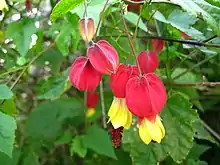Abutilon
Abutilon /əˈbjuːtɪlɒn/[2] is a large genus of flowering plants in the mallow family, Malvaceae. It is distributed throughout the tropics and subtropics[3] of the Americas, Africa, Asia, and Australia.[4] General common names include Indian mallow[5] and velvetleaf;[6] ornamental varieties may be known as room maple, parlor maple, or flowering maple. The genus name is an 18th-century New Latin word[7] that came from the Arabic ’abū-ṭīlūn (أبو طيلون),[8] the name given by Avicenna to this or a similar genus.[9]
| Abutilon | |
|---|---|
 | |
| Abutilon pictum | |
| Scientific classification | |
| Kingdom: | Plantae |
| Clade: | Tracheophytes |
| Clade: | Angiosperms |
| Clade: | Eudicots |
| Clade: | Rosids |
| Order: | Malvales |
| Family: | Malvaceae |
| Subfamily: | Malvoideae |
| Tribe: | Malveae |
| Genus: | Abutilon Mill.[1] |
| Species | |
|
about 200, see text | |
| Synonyms[1] | |
| |
The type species is Abutilon theophrasti. Several species formerly placed in Abutilon, including the cultivated species and hybrids commonly known as "flowering maples", have recently (2012, 2014) been transferred to the new genus Callianthe.
Description
Plants of this genus include herbs, shrubs, and trees.[3] They range in height from about 0.5 to 3 meters (1.5 to 10 feet).[10] The herbage is generally hairy to woolly or bristly.[11] The leaf blades are usually entire, but the occasional species has lobed leaves. They are palmately veined and have wavy or serrated edges. Flowers are solitary, paired, or borne in small inflorescences in the leaf axils or toward the branch tips. The calyx is bell-shaped with five lobes. The corolla is usually bell-shaped to wheel-shaped, with five petals joined at the bases.
The flowers of wild species are most often yellow or orange,[3] but can be red or pinkish, sometimes with a darker center. The stamens are fused into a tube lined at the mouth with anthers. Inside the tube is the branching style with head-like stigmas. The fruit is a rounded or hemispherical schizocarp with up to 20 segments, each containing a few seeds.[3][11]
Species
There are about 200 species in the genus.[3][11]
- Abutilon abutiloides (Jacq.) Garcke – bushy abutilon,[13] shrubby Indian mallow
- Abutilon albescens Miq.
- Abutilon asiaticum[14]
- Abutilon auritum (Wall. ex Link) Sweet – Asian Indian mallow
- Abutilon avicennae[15] - common yellow mallow
- Abutilon bedfordianum (Hook.) A.St.-Hil. – Bedford's mallow
- Abutilon berlandieri Gray ex S.Watson – Berlandier's Indian mallow
- Abutilon bidentatum A.Rich.
- Abutilon buchii Urb.
- Abutilon darwinii Hook.f. – Darwin's mallow
- Abutilon eremitopetalum Caum – hiddenpetal Indian mallow (Lānaʻi in Hawaii)
- Abutilon fruticosum Guill. & Perr. – Texas Indian mallow
- Abutilon giganteum (Jacq.) Sweet
- Abutilon grandiflorum G.Don
- Abutilon grandifolium (Willd.) Sweet – hairy Indian mallow
- Abutilon greveanum (Baill.) Hochr.
- Abutilon guineense (Schumach.) Baker f. & Exell
- Abutilon hirtum (Lam.) Sweet – Florida Keys Indian mallow
- Abutilon hulseanum Torr. ex A.Gray
- Abutilon hypoleucum A.Gray – whiteleaf Indian mallow
- Abutilon incanum (Link) Sweet – hoary abutilon, pelotazo (Southwestern United States, northern Mexico, Hawaii)
- Abutilon indicum (L.) Sweet – Indian abutilon, Indian lantern-flower, monkeybush
- Abutilon insigne Planch.
- Abutilon julianae Endl.
- Abutilon lauraster Hochr.
- Abutilon leonardi Urb. – woolly abutilon
- Abutilon leucopetalum (F.Muell.) F.Muell. ex Benth. – desert Chinese-lantern
- Abutilon listeri Baker f.
- Abutilon longicuspe Hochst. ex A.Rich.
- Abutilon malacum S. Watson – yellow Indian mallow
- Abutilon mauritianum (Jacq.) Medik.
- Abutilon megapotamicum A.St.-Hil. & Naudin – trailing abutilon
- Abutilon menziesii Seem. – koʻoloaʻula (Hawaii)
- Abutilon mollicomum (Willd.) Sweet – Sonoran Indian mallow
- Abutilon mollissimum
- Abutilon muticum
- Abutilon niveum Griseb. – white-flowered abutilon
- Abutilon oxycarpum – small-leaved abutilon
- Abutilon palmeri A.Gray – Palmer's Indian mallow
- Abutilon parishii A.Watson – Parish's Indian mallow
- Abutilon parvulum A.Gray – dwarf Indian mallow
- Abutilon pauciflorum A.St.-Hil. – woolly abutilon[16]
- Abutilon permolle (Willd.) Sweet – coastal Indian mallow
- Abutilon pictum (Gillies ex Hook.) Walp. – redvein abutilon, painted Indian mallow (syn. A. striatum)
- Abutilon pitcairnense Fosberg
- Abutilon purpurascens (Link) K.Schum.
- Abutilon reflexum (Juss. ex Cav.) Sweet
- Abutilon ramiflorum A.St.-Hil.
- Abutilon ranadei Woodr.et.Stapf- Indian son ghanta
- Abutilon reventum S.Watson – yellowflower Indian mallow
- Abutilon sachetianum Fosberg
- Abutilon sandwicense (O.Deg.) Christoph. – greenflower Indian mallow (Oahʻu in Hawaii)
- Abutilon sellowianum (Klotzsch) Regel
- Abutilon theophrasti Medik. – butterprint, abutilon-hemp, China-jute, velvetleaf (in USA), swamp Chinese-lantern
- Abutilon thurberi A.Gray – Thurber's Indian mallow
- Abutilon thyrsodendron Griseb.
- Abutilon trisulcatum (Jacq.) Britton & Millsp. – anglestem Indian mallow
- Abutilon venosum Lem.
- Abutilon virginianum Krapov. – Virgin Islands abutilon
- Abutilon wrightii A.Gray – Wright's Indian mallow
Hybrids
- Abutilon × hybridum (unknown parentage)
- Abutilon × milleri (A. megapotamicum × A. pictum)
- Abutilon × suntense (A. ochsenii × A. vitifolium)
Formerly placed here
- Bakeridesia integerrima (Hook.) D.M.Bates (as A. chittendenii Standl.)
- Briquetia spicata (Kunth) Fryxell (as A. spicatum Kunth)
- Corynabutilon ochsenii (Phil.) Kearney (as A. ochsenii (Phil.) Reiche)
- Corynabutilon vitifolium (Cav.) Kearney (as A. vitifolium (Cav.) C.Presl)
Cultivation
Some abutilons are cultivated as garden plants. Several hybrids and cultivars have been developed.
Cultivars, hybrids, and species that have gained the Royal Horticultural Society's Award of Garden Merit include:
Gallery




 Abutilon 'Kentish Belle'
Abutilon 'Kentish Belle'


References
- "Abutilon Mill". Tropicos. Missouri Botanical Garden. Retrieved 2017-04-18.
- Sunset Western Garden Book. 1995. 606–07.
- Abutilon. Flora of China.
- Esteves, G. L.; Krapovickas, A. (2002). "New Species of Abutilon (Malvaceae) from Sao Paulo State, Brazil". Kew Bulletin. 57 (2): 479. doi:10.2307/4111131. JSTOR 4111131.
- Abutilon. Integrated Taxonomic Information System (ITIS).
- Genus: Abutilon Mill. Archived 2014-04-29 at the Wayback Machine Germplasm Resources Information Network (GRIN).
- "abutilon". Oxford English Dictionary (Online ed.). Oxford University Press. (Subscription or participating institution membership required.)
- Porcher, Michel H. (2006). "Sorting plant names: Arabic index". Multilingual, Multiscript Plant Name Database. University of Melbourne.
Transcribed as abū-taylūn in the Plant Index. The New Oxford American Dictionary (3rd edition) gives ūbūṭīlūn - Chisholm, Hugh, ed. (1911). . Encyclopædia Britannica (11th ed.). Cambridge University Press.: written aubūtīlūn in both Britannica and the OED.
- Hildyard, A. (2001). Endangered Wildlife and Plants of the World. Marshall Cavendish. p. 22. ISBN 978-0-7614-7194-3.
- Abutilon. The Jepson eFlora 2013.
- "GRIN Species Records of Abutilon". Germplasm Resources Information Network. United States Department of Agriculture. Archived from the original on 2015-09-24. Retrieved 2010-12-05.
- Britton, N. L.; C. F. Millspaugh (1920). "Malvaceae". The Bahama Flora. The authors. p. 264.
- "Abutilon asiaticum in Global Plants".
- https://plants.jstor.org/stable/10.5555/al.ap.specimen.k000659603
- Britton & Millspaugh, p. 266
- "Abutilon megapotamicum". RHS. Retrieved 27 February 2020.
- "Abutilon × milleri". RHS. Retrieved 27 February 2020.
- "Abutilon 'Canary Bird'". RHS. Retrieved 27 February 2020.
- "Abutilon 'Cannington Carol'". RHS. Retrieved 27 February 2020.
- "Abutilon 'Cannington Peter'". RHS. Retrieved 27 February 2020.
- "Abutilon 'Kentish Belle'". RHS. Retrieved 27 February 2020.
- "Abutilon 'Linda Vista Peach". RHS. Retrieved 27 February 2020.
- "Abutilon 'Marion'". RHS. Retrieved 27 February 2020.
- "Abutilon 'Nabob'". RHS. Retrieved 27 February 2020.
- "Abutilon 'Orange Glow". RHS. Retrieved 27 February 2020.
- "Abutilon 'Savitzii'". RHS. Retrieved 27 February 2020.
- "Abutilon 'Souvenir de Bonn'". RHS. Retrieved 27 February 2020.
- "Abutilon 'Veronica Tennant'". RHS. Retrieved 27 February 2020.
